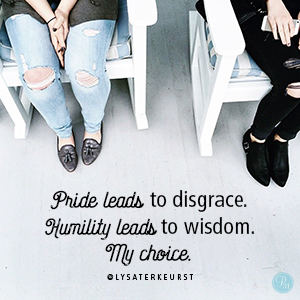
"That is why Scripture says, 'God opposes the proud but shows favor to the humble.'" James 4:6b (NIV)

You want to know one of the hardest three-word statements to make? "I am wrong."
It's so easy to point out wrong in others. It's so easy to want it to be someone else's fault. It's so easy to get critical and cynical and caught up in our limited perspectives.
But boy is it hard to see our own flaws. Where we went wrong. What we need to own.
I've been challenging myself on this. I recently had to correct one of my children for trying to blame someone else for something my child needed to own themselves.
I could clearly see the pride, the insecurity, and the fear all wrapped around her blaming words. And why could I see it so clearly?
Because it's always easier to spot in other people. But when I see pride in others, that's the exact moment where I must challenge myself to examine my own heart.
I had to have a conversation where I explained to my child something I'm learning myself. About blaming. And the dangerous path blaming can take us on.
In most conflicts I have two ways I can choose to travel:
The Path of Pride: I can blame the other person, focus only on their flaws and refuse to own my part of it. That response will increase my pride and decrease the Lord's blessing in my life.
The Humble Way: I can honestly assess what I'm contributing to this conflict, admit where I went wrong and ask for forgiveness. That response will lead to humility and increase the Lord's blessing in my life.
I see this principle woven throughout the Bible:
James 4:6b, "That is why Scripture says: God opposes the proud but shows favor to the humble."
Proverbs 29:23, "Pride brings a person low, but the lowly in spirit gain honor." (NIV)
Matthew 23:12, "For those who exalt themselves will be humbled, and those who humble themselves will be exalted." (NIV)
I know this. I believe this. So, why do I still find it hard to implement sometimes?
Well, here's where my head wants to go when I start examining certain conflicts: But what if it really isn't my fault? It's not fair to assign the blame with me when this person did this and this and this.
But that's the wrong direction to go. Don't try to assign the blame. Just own the part you brought into the conflict. When I approach conflict with a heart of humility, I've yet to see where I haven't added something to the issue.
And if the other person doesn't own their issues - the Lord will deal with them. (See the verses above.)
There are gifts hidden in the tough stuff of conflict. There is grace and honor to be gained. But I'll only see those gifts if I stop blaming others and start examining myself.
Dear Lord, I want to follow Your teaching in this. But it's so hard. I'm mad and frustrated and hurt. The last thing I feel like doing is examining where I am wrong. But I know that's what I need to do. Will You soften my heart? Will You give me eyes to see beyond my hurt? Will You help me cut through the assumptions and wrong-thinking? I want to honor You in this, I really do. In Jesus' Name, Amen.
***


Join the Conversation